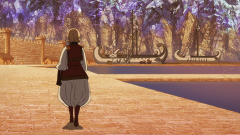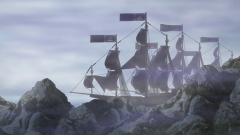Shoukoku no Altair ran a double feature last Friday to reclaim some lost ground after its brief hiatus earlier this month. I’ll be covering both episodes here, but this post won’t be any longer than normal. Truthfully, although Altair moves through its plot at a rapid pace, it’s often a struggle for me to generate worthwhile commentary about the series, and its latest offerings are no exception. This week, I watched as Imperial forces utilized a two-pronged attack to conquer Phoinike, after which point Mahmut was smuggled from the city and rescued by a friendly ship, recovered from a life-threatening wound for nine days, arrived in Venedik, and was granted an audience with their leader. That’s a lot of stuff packed into 42 minutes, but the show is so matter-of-fact in its presentation that I haven’t a shred of desire to speculate about its characters, or what fates will befall them. “The Sinking City” ends with Mahmut getting straight to the point (that’s all anyone seems to do in this world) and quizzing Venedik’s leader about the betrayal of their former ally, but I doubt the show will do anything other than handwave the question and jump to the next story beat when it resumes.
One curious sequence from the first of these two episodes occurs during its opening minutes, when an Imperial ship helmed by unwilling soldiers begins to take on water. Immediately after this scene, there’s a shot of Glalat (the blond nobleman) sharpening his sword with a whetstone. The implication is that Glalat sank one of his own ships, predicting that the disgruntled men within his ranks would use that opportunity to escape and beg Phoinike for asylum. For his ploy to stay on track, Phoinike would then need to fall for this obvious bait and lower the chains that restrict entrance to the city, allowing Glalat’s ship to break into the bay, but only if a tailwind arrived to push it through precisely as it began its approach. This is some Death Note-tier planning, complete with a character furiously scribbling nautical calculations on a piece of parchment as the scene unfolds. Of course, the Empire’s strategy is successful, but what was intended to be a pulse-pounding miracle of a defeat for our heroes instead feels ridiculous. Implausibility isn’t the only issue here, however – the bigger problem is that we know so little about the Phoiniken characters that the events around them have no dramatic weight, despite all that we’ve heard about the city’s past invincibility.
The second episode was marginally better, despite feeling like it was playing in fast-forward for most of its length. Kiros got the best material, including a runner where he tried to feed Iskender multiple times before finally managing not to get squawked at. The kulak and the eagle are two of a kind, really, in that they’re both slow to trust; Kiros was immediately suspicious of Abiraga, the red-haired leader of the fleet that picked them up, even after he allowed Mahmut to recuperate in his room for more than a week. Kiros’ mistrust is likely misplaced, as we audience members know from the OP that Abiraga will eventually accompany Mahmut on his journey, but in the meantime, his smiling opacity lends his character a dash of intrigue. My guess is that he’s another kulak, and that we’ll get some backstory sooner rather than later, but I’d be happy to be wrong on one or both counts.





I suggest you lower your expectations for this show and give due consideration to dropping it at the end of this cour. The manga was never very strong on characters or plotting. The anime is actually doing better in this regard. The strengths of this story lie elsewhere, in areas you clearly have little interest.
We seem to be on the same page where my continued viewership of Altair is concerned. I just asked the admins for permission to drop the show once the fall season starts, so I’ll try to be kinder to it over the next month. Still, out of curiosity – what are the strengths of this story, if not characters or plotting? Hearing from a manga reader might help me adjust my perspective.
In my humble opinion Altair is one of those stories that is more interested in world building and exploring certain philosophical points and themes over traditional story telling elements like characters and plotting. It was one of the reasons I was glad for the anime adaptation. I thought the anime would fix some of the frustrating character and plotting issues in the manga. It has to some degree but as you can tell deep problems remain.
One of the manga’s strengths is world building. If you are familiar with European and Ottoman history or have passing knowledge of middle eastern traditions you will find a lot interesting in Altair. This does nothing for me personally.
The other strength, the one that fascinates me, is Altair’s exploration of the concepts of patriotism and operating in the national interest. Almost everyone in the show good or bad is acting in what they believe to be the national interest of their country or their people.
The answer the Venedik leader will give Mahmut is at the heart of the show. The reason he was willing to turn his back on a good friend and a centuries old alliance is what this show is about. These things will happen with even more intensity as the show goes on and Mahmut will have to learn that in this world leaders put their national interest above everything (Their lives, their popularity, their family, their friends, their lovers, their wealth etc.) If he wants a nation to do something he will have to phrase it as being in their national interest and if he wants them to trust him he must show that his motivations stem from his nations national interest. This is all over the show, just pay attention to Glalat’s motivations for fighting for Balt-rein. Did he believe in their cause? Was he just a bloodthirsty mercenary? No. National interest. Why did the city fall? Could an important contributor be that someone put other things, like honor and chivalry and friendship above their national interest?
This is especially fascinating to me because I live in a world where leaders do things that are obviously against their national interest for all kinds of frivolous and stupid reasons.
The idea that Mahmut needs to learn how nations operate isn’t lost on me. The way his budding sense of pragmatism conflicts with his default idealism is one of the show’s better themes – I touched on this a bit in my review of the fifth episode, though not as well as you did above. The rationality of Mahmut’s world isn’t sufficient to overcome its dryness, though, at least not for me. Glalat may be fighting to supply his barren homeland with more resources, and Konstantinos’s obsession with the past glories of his homeland may have led to his demise, but their successes and failures don’t make me feel anything, because neither man is complex enough to warrant that level of investment. But I’m coming back to the characters again, and as you say, that isn’t where Altair excels.
I’ll pay close attention to the conversation between Mahmut and Doge Lucio in tomorrow’s episode. Hopefully the anime will do it justice.